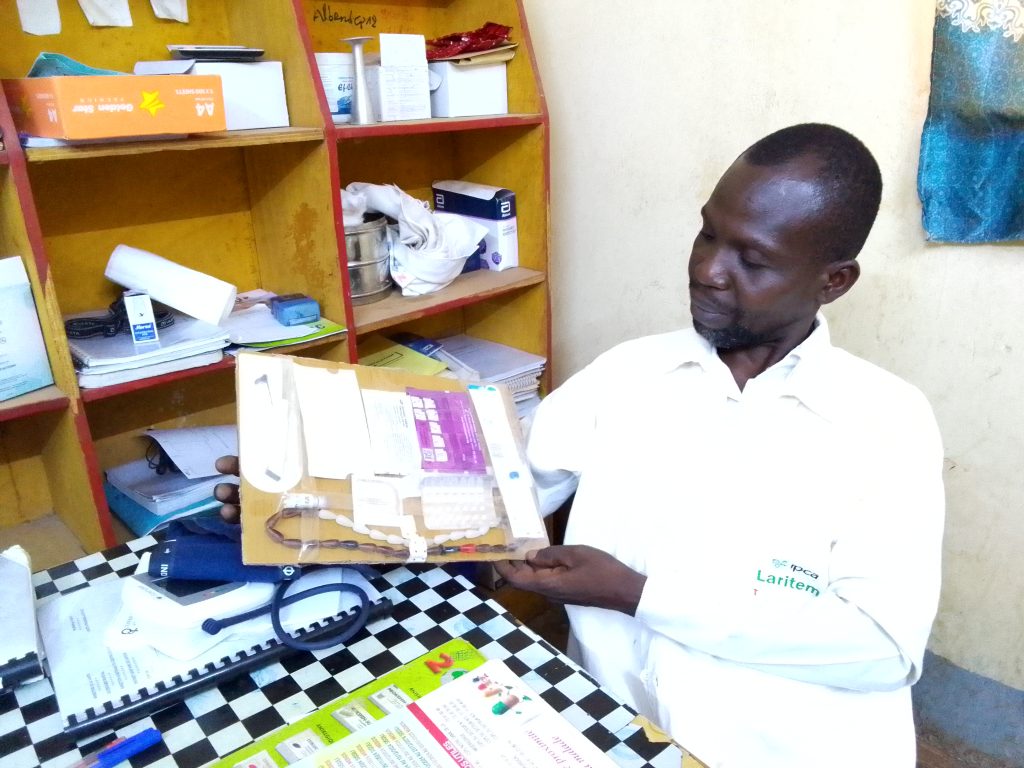Health Care Voices from Burkina Faso
Published on July 17, 2024
By Abdoulaye Diessongo, Monitoring and Evaluation Assistant; Philomene Bambara, Office Manager; Helene Dakuyo, Family Planning/Maternal, Newborn, and Child Health Officer; Severin Toe, Office Manager; MOMENTUM Integrated Health Resilience, Burkina Faso
In Burkina Faso, access to health care services has been compromised due to issues such as armed conflict, economic adversity, and climate-related shocks. According to UNICEF, approximately 3.6 million people have been deprived of access to health care, with 397 health facilities—19 percent of all such facilities nationwide—closed, and 381 operating at minimum capacity. To help communities respond to these challenges, MOMENTUM Integrated Health Resilience supports the Ministry of Health and local partners to implement evidence-based practices in a variety of critical areas, as illustrated in the stories told by dedicated local health professionals.
Midwife and Proud of It
My name is Adjiratou Diessongo. I am a midwife at the Béguédo Medical Center, located in a rural commune in Burkina Faso’s Center-East region. I’m proud of my work, and you’ll understand why.

Recently, I received a pregnant woman for her fourth antenatal visit. The 27-year-old was passing through Béguédo and had attended her first three visits in another town. During the consultation, the patient complained of headaches and dizziness that she believed could be due to sunburn, but I wanted to know a bit more. She was on her third pregnancy, but one of the first two did not result in a [viable birth]. On examination, she was in good general condition but with an eye infection and fluid retention. When her vital signs were taken, her blood pressure was elevated.
Based on my newly enhanced knowledge from the MOMENTUM training on basic emergency obstetric and newborn care high-impact practices, I made a presumptive diagnosis of severe preeclampsia. I offered her an emergency evacuation to the Medical Center with Surgical Services in the Garango health district, where she could receive better care. I ensured she was stabilized for transport. Her husband joined the ambulance that evacuated her to Garango, approximately 15 miles away.
The diagnosis was confirmed, and the woman was then evacuated to the better-equipped Tenkodogo Regional Hospital, where she gave birth to a little girl. The baby was placed in an incubator for a few days, and the mother and her child returned home safe and sound.
Last year, I also benefited from a training for mentors, which enabled me to become a master mentor to other midwives. These skills have been reinforced this year with practical sessions such as “Helping Mothers Survive” and “Helping Babies Breathe.” Thanks to these MOMENTUM-supported trainings, I was able to save the life of a mother and her baby. Let’s fight fiercely against maternal and neonatal deaths.
New Infrastructure and Training Boosts Confidence and the Quality of Care
I am Zongo Charles Lebon, head nurse at the Yahvé Rapha private health facility in Sapouy, located in the Center-West region of Burkina Faso. I have been working at Yahvé Rapha as a permanent staff member for seven years now.

Before MOMENTUM started here, we were very limited. We had an old pressure cooker that we used to do sterilization by boiling reusable instruments, but this technique was not always an option due to frequent ruptures in the cooker caused by the butane gas. Instead, we used bleach for high-level disinfection, though it is often not available.
At the beginning of our collaboration with MOMENTUM, our health unit benefited from a rapid assessment. Shortcomings were identified, and MOMENTUM provided recommendations to the nursing staff as well as to the health facility leadership. We [undertook] the construction of a garbage bin in the sanitary facility and the construction of three new bathrooms, one for the staff and two others to complement an existing one for clients, with the goal of improving hygiene at the facility.
With MOMENTUM’s support, we also received … health provider training in clinical family planning, as well as compliance with U.S. Government voluntary family planning policies and environmental regulations. After the training, the facility’s capacities were strengthened through the provision of medical and technical equipment [e.g., blood pressure monitors, hot air sterilizers, and implant insertion/removal boxes] that can improve the quality of services we offer.
With the knowledge received during the training, our health providers saw 85 family planning clients in only three months, compared to 26 in the previous year. It’s also worth mentioning that, before the training, we faced challenges in fulfilling the needs of… clients seeking long-acting contraceptive methods such as intrauterine devices and implants. These challenges stemmed from both a lack of expertise and insufficient medical equipment.
But now, we are technically operational, with quality … equipment that enables us to offer a wide range of contraceptive methods. I am also pleased because I am more self-assured when providing counseling. Regardless of the contraceptive method, I am confident in myself and in what I am doing or saying to the client.
***
These personal stories demonstrate that, despite ongoing challenges and conflicts, MOMENTUM supports countries to maintain and improve health services. Dedicated local staff like Adjiratou and Zongo make it all possible.

